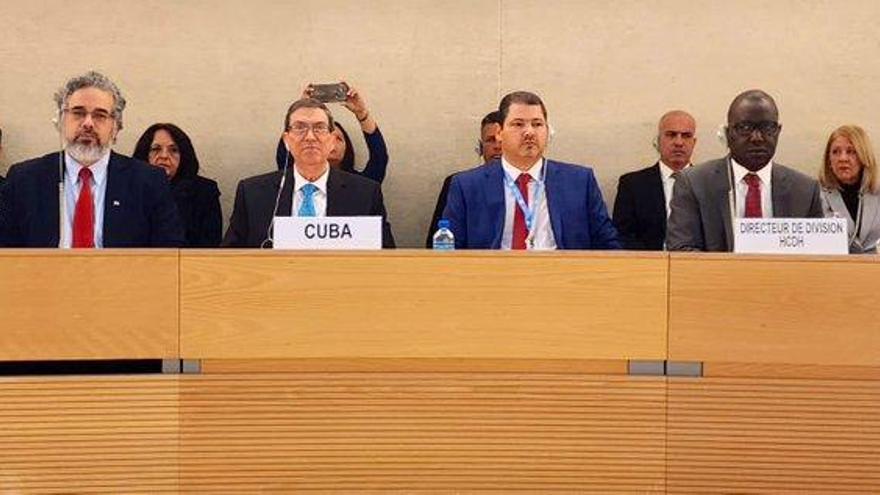
![]() 14ymedio, Madrid, 20 November 2023 — Since Monday, the three officials who defended the regime in the most recent Universal Periodic Review (UPR) before the Human Rights Council at the UN, on November 15, are on the list of Cuban repressors prepared by the Foundation for Human Rights in Cuba (FDHC). They are the jurist Yuri Pérez Martínez, the lieutenant colonel of the Ministry of the Interior Luis Emilio Cadaval San Martín and the doctor Carlos Alberto Martínez Blanco.
14ymedio, Madrid, 20 November 2023 — Since Monday, the three officials who defended the regime in the most recent Universal Periodic Review (UPR) before the Human Rights Council at the UN, on November 15, are on the list of Cuban repressors prepared by the Foundation for Human Rights in Cuba (FDHC). They are the jurist Yuri Pérez Martínez, the lieutenant colonel of the Ministry of the Interior Luis Emilio Cadaval San Martín and the doctor Carlos Alberto Martínez Blanco.
The three are classified as “exported repressors,” which are, according to the FDHC in a statement, “those agents of the regime sent abroad to organize, advise or even participate in repression in countries allied with the Government of Cuba, or in the subversion of order in democratic countries.” This includes “diplomats or other representatives of the Government who, from abroad, distort the harsh Cuban reality, spreading official propaganda instead.”
Thus, the organization, based in the United States, has opened a file on Yuri Pérez Martínez, a professor at the University of Havana, for stating in Geneva that the Cuban Constitution, approved in 2019, recognizes the freedoms of expression, assembly, demonstration and association, “without explaining that exercising them entails long prison sentences,” and for ensuring that on the Island the elections are free, democratic and transparent, ignoring that “independent candidates for municipal assemblies are blocked, threatened and repressed, and that the candidates for provincial and national assemblies are approved by a candidacy commission composed of members of organizations controlled by the Government.”
All three are classified as “exported repressors,” agents of the regime sent abroad
Emilio Cadaval San Martín, judicial advisor to the Department of State Security, for his part, “falsified the reality of the criminal procedure, assuring that arbitrary detentions are prohibited,” in addition to denying the existence of political prisoners in the country, suggesting that those in prison are common criminals who “committed offenses such as public disorder, failure to comply, contempt and sedition.”
Finally, Dr. Carlos Alberto Martínez Blanco, says the Foundation, “offered, based on official statistics, an idyllic picture of today’s dysfunctional public health system in Cuba, blaming the U.S. embargo for the shortcomings.” At the same time, the official “omitted information such as the enormous disproportion between investments in health and tourism, the dispossession and surveillance of which Cuban medical collaborators abroad are victims and the criminal policy of keeping the population defenseless against COVID-19 for almost a year while waiting for a Cuban vaccine to be ready.”
The three officials join the same register of repressors where, for example, two officers of the Border Guard Troops are found responsible for the sinking of a boat in Bahía Honda, Artemisa, where seven people died, including a two-year-old girl in 2022, as well as several officials in charge of the repression of peaceful protests and even Alberto González Casals, director of the International Press Center, in charge of foreign journalists.
Translated by Regina Anavy
____________
COLLABORATE WITH OUR WORK: The 14ymedio team is committed to practicing serious journalism that reflects Cuba’s reality in all its depth. Thank you for joining us on this long journey. We invite you to continue supporting us by becoming a member of 14ymedio now. Together we can continue transforming journalism in Cuba.
